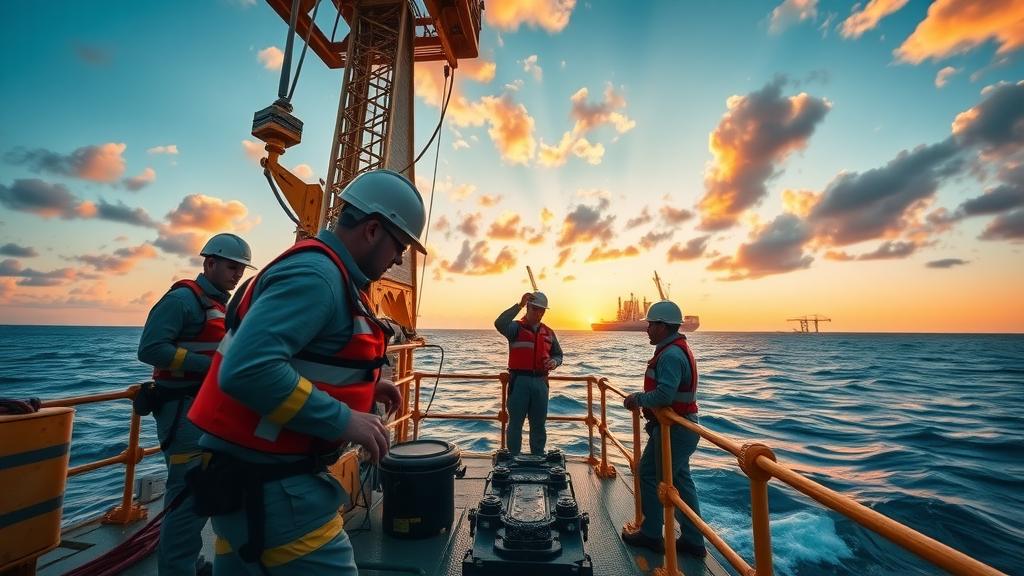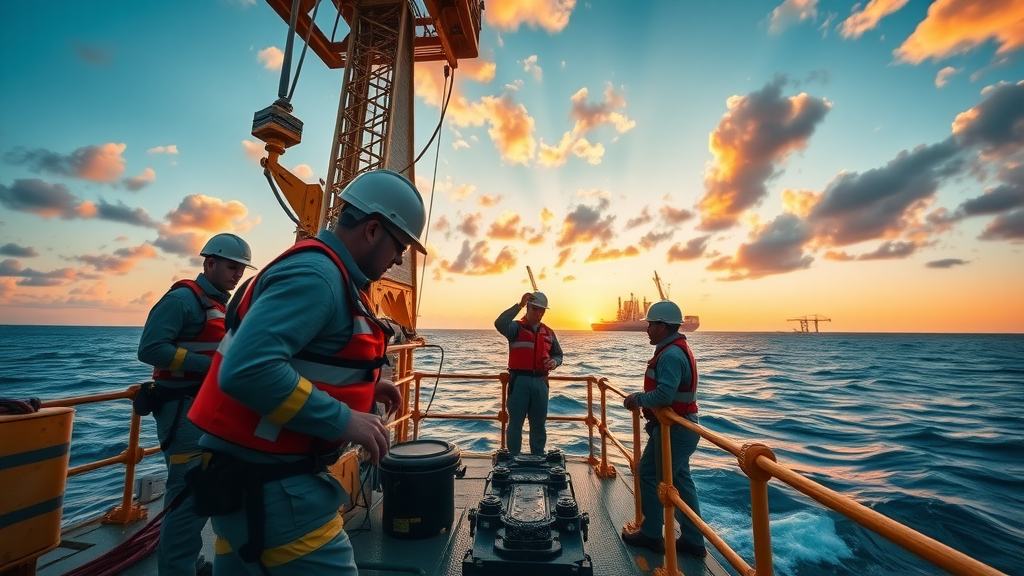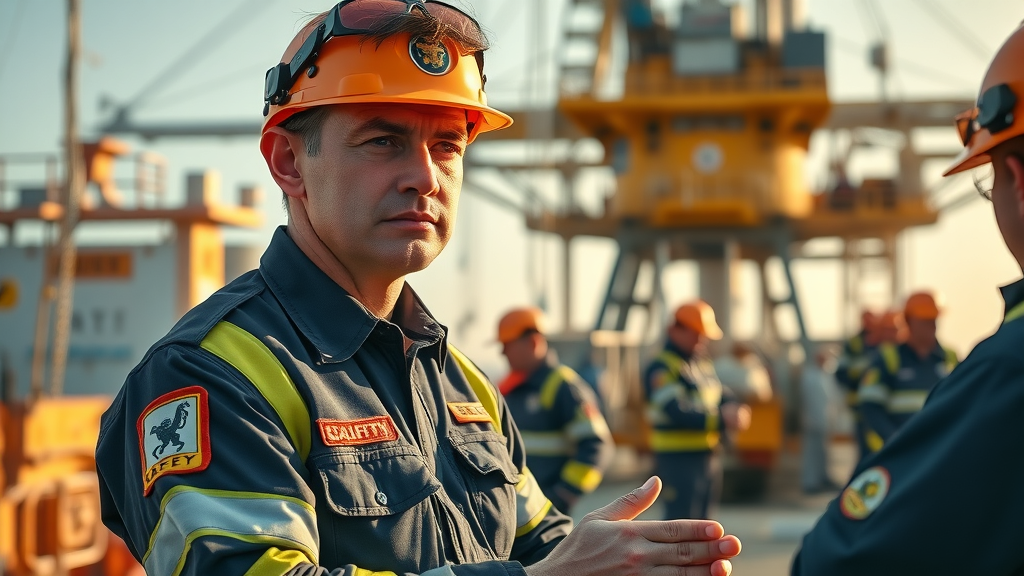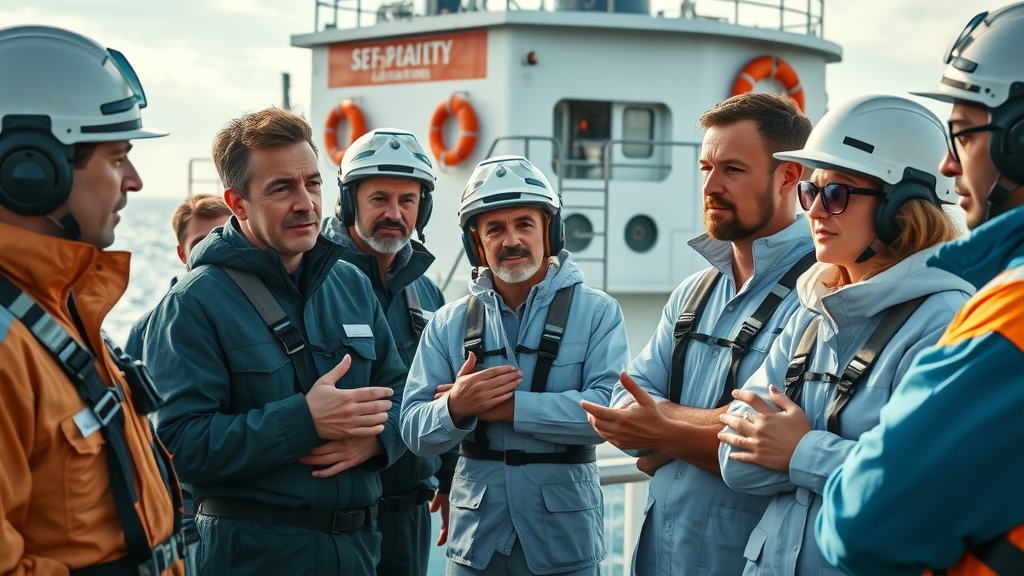
Did you know that over 80% of oil rig incidents can be prevented with the right safety professional in place?
The energy and infrastructure sectors rely on specialized offshore safety professionals with the expertise to manage risks and keep crews safe. If you’re interested in a career that blends high demand, robust compensation, and meaningful responsibility, offshore oil rig safety jobs are taking center stage in 2024. In this guide, you’ll learn which roles are critical, what qualifications and certifications are required, and how you can start or advance your career as a safety professional on offshore platforms.
A Startling Look at Offshore Oil Rig Safety Jobs: Industry Insights
“Over 80% of oil rig incidents can be prevented with the right safety professional in place.” – Offshore Workforce Report
The offshore oil and gas industry is a global leader in the engineering and construction of major projects for the energy and infrastructure sectors. This field is organized into business lines dedicated to safety and operational excellence. Safety professionals are at the heart of this mission, ensuring standards are applied and contractor compliance is maintained. The construction of major projects onboard offshore and onshore platforms brings together highly trained individuals whose primary goal is risk assessment and incident prevention.
With the increasing complexity of offshore projects, the role of certified safety professionals has become indispensable. Companies like Saipem, a global leader in engineering and construction, recognize that their business lines need strong safety teams to monitor site safety, conduct risk assessments, and ensure permit compliance on every construction vessel to ensure zero accidents. The demand for skilled safety professionals in offshore oil rig safety jobs is projected to climb in 2024, as regulations tighten and new energy projects ramp up.
What You’ll Learn About Offshore Oil Rig Safety Jobs
-
The most sought-after offshore oil rig safety jobs in 2024
-
Key responsibilities and required certifications for safety professionals
-
Average salaries and compensation insights for various offshore safety roles
-
Top qualifications recruiters seek in the offshore oil rig safety field

Top Offshore Oil Rig Safety Jobs: Features, Benefits & Requirements
Offshore oil rig safety jobs encompass a broad range of positions that require specialized training, certifications, and a focus on high-stakes risk management. The energy and infrastructure sectors heavily invest in the right mix of professionals—offshore and onshore—to oversee safety standards and compliance with HSE (Health, Safety, and Environment) policies. Key roles include Safety Officers, HSE Managers, Medics, Supervisors, and Emergency Response Coordinators. These professionals are organized into business lines that span engineering and construction, infrastructure projects, and major offshore developments. Their job responsibilities extend from risk assessments and safety certifications to monitoring site safety and assisting improvements in operational procedures.
Successful offshore safety professionals must meet rigorous permit compliance requirements, perform regular risk assessments, and contribute to company policies that protect the crew and the environment. They are tasked with overseeing or supporting vessel to ensure safe operations, leading safety drills, and coaching teams in safety best practices. Safety certifications and ongoing education are central to their advancement, and many report that assisting the offshore company with compliance and “zero-incident” operations results in significant career growth and mobility on both offshore and onshore projects.
Comparison of In-Demand Offshore Oil Rig Safety Jobs
|
Job Title |
Key Duties |
Required Certifications |
Average Salary (USD) |
|---|---|---|---|
|
Offshore Safety Officer |
Risk assessment, safety checks, permit compliance, training crew, incident reporting |
BOSIET, NEBOSH, OSHA |
$70,000 – $110,000 |
|
HSE Manager |
Overseeing HSE policies, compliance with standards, audits, improvement programs |
BOSIET, NEBOSH Diploma, CSP |
$90,000 – $150,000 |
|
Safety Supervisor |
Supervise safety staff, conduct safety meetings, enforce procedures, coach teams |
BOSIET, NEBOSH |
$80,000 – $120,000 |
|
Offshore Medic |
Provide emergency care, manage health records, conduct health & safety training |
Medical License, Offshore First Aid, BOSIET |
$65,000 – $105,000 |
|
Emergency Response Coordinator |
Plan and implement emergency response, lead drills, liaise with rescue agencies |
BOSIET, Incident Command Training |
$85,000 – $135,000 |
Offshore Oil Rig Safety Officer: Role, Benefits, and Growth
-
Duties & compliance standards for safety officers
-
Growth potential and industry demand
-
How to stand out as a safety professional on offshore rigs
An offshore oil rig safety officer is the backbone of operational safety in energy and infrastructure sectors. Their job responsibilities are to conduct proactive risk assessment, enforce safety standards, and guarantee contractor compliance across all aspects of operations. This role is central to both onboard main activities and assisting the offshore company in staying compliant with global safety laws. Certifications such as BOSIET, NEBOSH, and regular risk assessments are essential for effective job performance. These safety professionals lead safety meetings, coach teams on procedure, monitor site safety, and coordinate with business lines dedicated to engineering and construction.
Career advancement as a safety officer is robust, given the ongoing pipeline of major projects requiring diligent risk management. The industry rewards certifications, experience, and leadership—attributes that help safety professionals stand out when pursuing construction vessel to ensure accident-free records. Growth avenues include specialization in hazardous environments, transitioning to site representative or HSE manager, and assisting improvement in organizational safety culture. As demand surges, those with a strong educational background, track record in compliance with HSE policies, and active pursuit of certificationsmonitor site safety can expect exceptional career mobility.

Other High-Demand Offshore Oil Rig Safety Roles
-
Safety Supervisor
-
Environmental Health and Safety (EHS) Manager
-
Offshore Medic
-
Emergency Response Coordinator
Safety Supervisors act as the frontline safety professionals onboard main projects, coaching teams and supporting contractor compliance. They often serve as the designated site representative for their business lines, ensuring standards are applied and audits are conducted according to global benchmarks. EHS Managers, on the other hand, oversee safety programs for both offshore and onshore operations, managing HSE policies and guiding improvement initiatives for the organizational safety management system.
Offshore Medics provide critical first aid and emergency care, collaborating closely with safety officers to run health and safety drills. They are essential to the ongoing health of workers, especially on construction of major infrastructure projects where medical emergencies can occur. Emergency Response Coordinators plan rescue operations, direct on-scene response, and liaise with search and rescue agencies, ensuring every construction vessel to ensure readiness for worst-case scenarios. All these roles require a mix of academic and practical expertise, risk assessments, and the ability to respond quickly to emergencies onboard and across diverse sites.

Video Guide: A Day in the Life of an Offshore Oil Rig Safety Professional
Gain a real-world perspective as a global leader in offshore safety takes you through a typical day: from early-morning risk assessments and safety checks to responding to emergencies, organizing compliance drills, and facilitating major projects onboard the rig. Watch how safety professionals work hand-in-hand with business lines across engineering and construction to keep every operation smooth, safe, and efficient in the energy sector.
Qualifications & Pathways: Becoming a Certified Offshore Oil Rig Safety Professional
-
Essential degrees and certifications (BOSIET, NEBOSH, OSHA, etc.)
-
Hands-on training vs. academic credentials
-
Certification renewal and ongoing education
Becoming a safety professional on an offshore rig requires a blend of education and hands-on experience. Most employers look for candidates with relevant degrees in occupational health, engineering, or environmental science, along with industry-standard certifications like BOSIET (Basic Offshore Safety Induction and Emergency Training), NEBOSH, OSHA, and sometimes CSP or specialized first aid credentials. These certificationsmonitor site safety, risk assessments, and compliance with HSE policies—essentials for roles in major projects organized into business lines in engineering and construction.
Practical experience is highly valued, as hands-on safety training, risk assessment scenarios, and safety coach will support new hires’ ability to respond in high-pressure situations. Ongoing renewal of certifications and continuing education are not just requirements—they reflect a culture where training saves lives and keeps operations in compliance with global standards. The quote below from a senior offshore safety officer sums it up well:
“Continuous training saves lives on the rig. It’s as important as any paycheck.” – Senior Offshore Safety Officer

Compensation & Benefits in Offshore Oil Rig Safety Jobs
|
Average Salaries by Offshore Oil Rig Safety Job Title |
|
|
Job Title |
Average Salary (USD) |
|---|---|
|
Safety Officer |
$70,000 – $110,000 |
|
HSE Manager |
$90,000 – $150,000 |
|
Safety Supervisor |
$80,000 – $120,000 |
|
Medic |
$65,000 – $105,000 |
Salaries for offshore oil rig safety jobs are among the most competitive in the energy and infrastructure sectors. High pay is driven by the vital role these safety professionals play in ensuring operational continuity and minimizing incidents that could result in costly downtime or regulatory fines. For example, a safety officer can expect to earn between $70,000 and $110,000 annually, while HSE managers and Emergency Response Coordinators can reach six-figure salaries, thanks to their advanced certificationsmonitor site safety and risk mitigation responsibilities. The compensation structure also reflects the rigors of offshore and onshore deployment, demanding schedules, and the strategic importance of these roles in major projects.
Perks and Unique Benefits for Offshore Safety Professionals
-
Hazard pay and wellness incentives
-
Rotation schedules: time on/off
-
Comprehensive insurance and retirement options
In addition to base salaries, offshore oil rig safety jobs offer perks that are seldom matched in other industries. Hazard pay can substantially boost take-home pay for professionals working in high-risk zones. Wellness incentives, on-site amenities, and access to fitness and recreation facilities are common as companies recognize the importance of mental health for crews spending extended time offshore.
Many offshore safety jobs utilize rotation schedules—often two weeks on, two weeks off—which appeal to those seeking work-life balance or extended time at home between assignments. Comprehensive insurance, medical coverage, and robust retirement savings plans are standard, reflecting the high value companies place on attracting and retaining skilled safety professionals. These benefits reinforce why so many aspire to advance in safety roles organized into business lines across the global leader companies.

Reviews & Testimonies: What Offshore Oil Rig Safety Professionals Say
“Safety roles are challenging but offer exceptional rewards—financial and personal.” – Offshore Rig Safety Supervisor
Current and former offshore safety professionals consistently highlight strong job satisfaction—citing not just the compensation and benefits, but the pride that comes from playing a pivotal role in protecting lives and complex energy projects. Many report that the camaraderie built among crew members and the fast-paced environment fuel personal and professional growth. The opportunity to influence safety culture across business lines and make a meaningful impact on the construction of major projects—onboard main vessels and onshore facilities alike—is a key driver for those who stay and advance in this line of work.
Safety professionals also value the global nature of their roles. Projects may take them around the world, assisting improvement initiatives with industry leaders like Saipem and other global engineering and construction giants. The skills and certifications acquired are transferrable, offering lasting career flexibility in the ever-evolving energy and infrastructure sectors.
People Also Ask About Offshore Oil Rig Safety Jobs
How to become an oil rig safety officer?
To become an oil rig safety officer, start by earning a relevant degree in occupational health, engineering, or environmental science. Next, obtain mandatory certifications such as BOSIET (Basic Offshore Safety Induction and Emergency Training) and NEBOSH. Many roles require hands-on experience either offshore or onshore, often gained by working under a safety coach who will support your transition. Regularly updating training and certificationsmonitor site safety is necessary. Building a career in this field means committing to ongoing education, practical risk assessment, and contractor compliance across your assignments.
How much does an offshore oil rigger make?
Offshore oil riggers’ salaries vary by role, experience, and employer. Entry-level positions start at around $50,000, while highly skilled professionals, such as safety officers or medics, can earn between $65,000 and $110,000 yearly. Specialized safety professionals in senior positions (HSE managers, supervisors) may earn up to $150,000, particularly on major projects or when working for a global leader in engineering and construction. Extra compensation often includes hazard pay, bonuses, and comprehensive benefits.
How much does a safety man make in the oil field?
A “safety man” (colloquial for a safety officer or supervisor) in the oil field typically earns between $70,000 and $120,000 per year, with the potential for more if working offshore and holding additional certifications (like NEBOSH or OSHA). Pay scales reflect the increased risk, complex responsibilities, and need for compliance with HSE policies on major projects for the energy and infrastructure sectors. Rotation schedules and hazard pay can further enhance earning potential.
Do oil rig workers make $200,000?
While most oil rig workers do not make $200,000 annually, senior-level safety professionals, HSE managers overseeing global business lines, or those working extreme overtime in remote offshore locations may approach this earnings level—especially when factoring in hazard bonuses and rotation incentives. High compensation is more common among specialists involved with construction of major projects and those operating in the industry’s most hazardous environments. Regular salary for safety roles typically ranges from $70,000 to $150,000.
FAQs About Offshore Oil Rig Safety Jobs
-
What qualifications do offshore oil rig safety jobs require?
Most roles require a degree in occupational safety, engineering, or environmental science, and certifications such as BOSIET, NEBOSH, and OSHA. Hands-on experience is highly valued. -
Are offshore oil rig safety professionals in demand?
Yes, demand is increasing as energy and infrastructure sectors expand, regulations tighten, and companies invest in safer, more efficient major projects. -
What is the career growth outlook for offshore safety officers?
The outlook is strong. Growth is driven by global expansion of energy projects, stricter safety standards, and the need for certified professionals on new platforms. -
Is experience more important than certification?
Both are important. Many employers require both certificationsmonitor site safety and years of offshore or onshore safety experience, especially for leadership roles. -
What are the main risks for offshore safety professionals?
Key risks include exposure to hazardous environments, emergencies at sea, and high-pressure situations requiring rapid decision-making and compliance with strict safety standards.

Key Takeaways: Offshore Oil Rig Safety Jobs
-
Safety professionals are crucial to offshore oil rig operations.
-
Certifications like BOSIET and NEBOSH boost employability and salary.
-
High income potential and rotational schedules are significant draws.
-
Demand for well-trained safety professionals continues to climb.
Conclusion: Take the Next Step for Offshore Oil Rig Safety Jobs
Pursue advanced certifications, stay current with industry standards, and explore opportunities with global leaders to maximize your career in offshore oil rig safety jobs.





